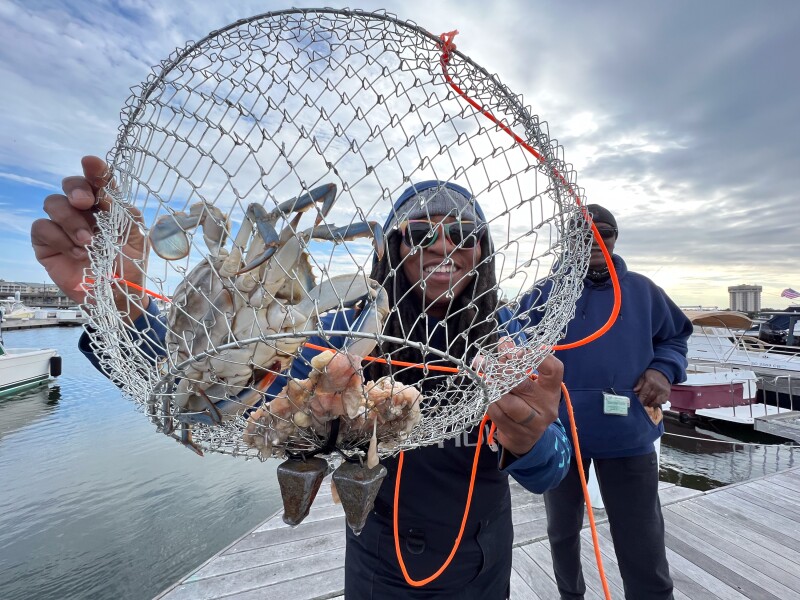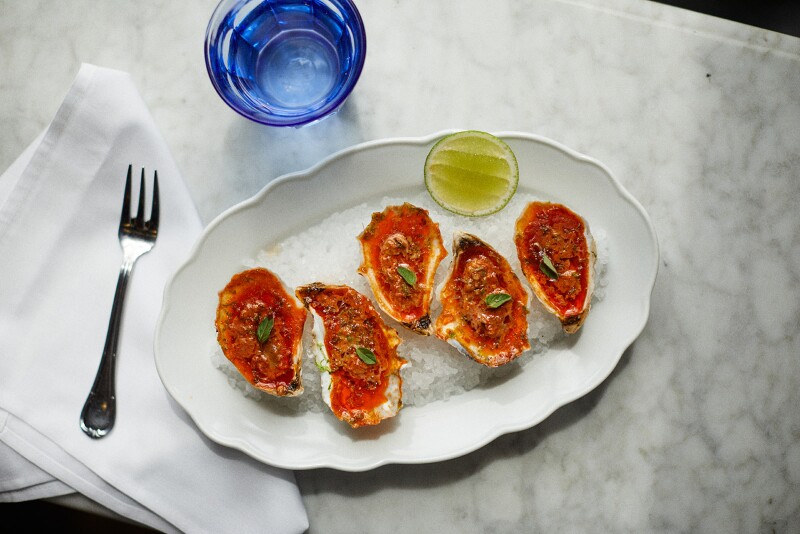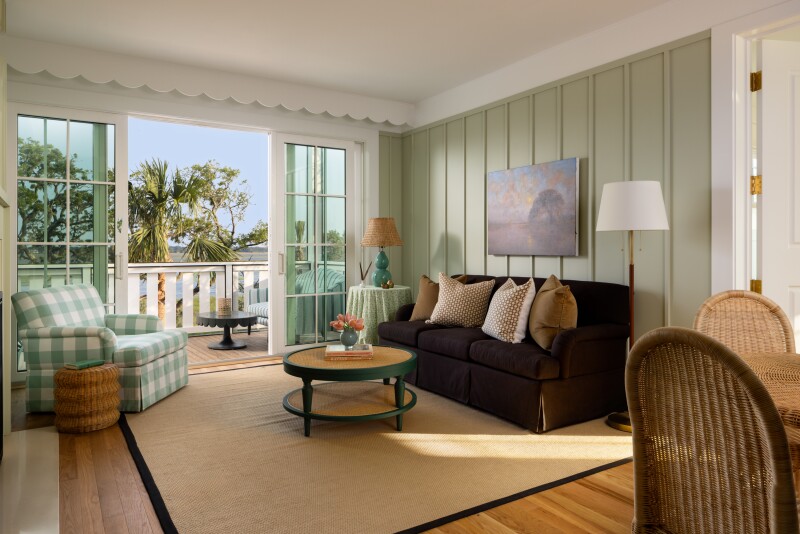In 1989, Hurricane Hugo brought high winds, heavy rain, and a 20-foot storm surge that left Charleston in tatters. Hugo still lives in infamy in the city’s collective consciousness, but these days, thanks to climate change, “storms of the century” seem to threaten each year. And while preservation has long been central to Charleston’s identity—after all, those historic mansions and cobblestone streets draw more than 7 millions visitors each year—the need to protect the city’s resources, both natural and cultural, has never been more urgent.
With tourism playing a vital part in the local economy, businesses that cater to visitors are active in making Charleston a more friendly place, not only to the environment but also to people of all backgrounds. Here are a few of the operators that are helping the Holy City become even more hallowed ground.

Casual Crabbing with Tia founder Tia Clark began fishing for crabs as a way to be healthier after she quit smoking, and she now shares the pursuit with others.
Photo courtesy of Casual Crabbing with Tia
Tours and museums that support the coastal ecosystem
A variety of tour operators and museums offer deeper dives into Charleston’s environment. Perhaps none is more influential than Coastal Expeditions, which leads eco-tours of the city’s waterways on kayaks, stand-up paddleboards, and boats.
“We’ve been in business since 1992,” says marketing director Kari Crolley, who owns the company with her husband, Chris. “While we’ve always been environmentally minded, in the last 10 years we’ve become environmentally focused.” That change largely traces back to 2017, when Hurricane Irma swept away critical habitat at Crab Bank Seabird Sanctuary in Charleston harbor. Concerned for the fate of local black skimmers, Coastal Expeditions helped organize a harbor paddling trip to raise awareness. Not long after, the Crolleys established the Coastal Expeditions Foundation, which raises money and donates proceeds from retail shop sales—including an outpost at the Dunlin, an Auberge Collection Resort on John’s Island—to help restore critical Lowcountry habitats.
If you want something to eat while you learn about the coastline, opt for a Lowcountry Oyster Co. farm tour. Located an hour’s drive south of the city, this outfit takes oyster lovers out into the beautiful ACE Basin estuary on a 20-foot skiff. Founder and president Trey McMillan grows oyster seeds in a land-based nursery, then places them out here in floating cages that you can see up close on the tour. “This method helps protect the wild stock,” he says, “while providing a local seafood source.”
Prefer crabs to oysters? Go Casual Crabbing with Tia. Charleston native Tia Clark began crabbing in part to reconnect with her Gullah Geechee roots, and now she passes the traditional practice on to hungry clients.
Even Charleston’s tent-pole institutions are invested in coastal conservation. For example, in addition to offering visitors a glimpse into the Southeast’s complex ecosystem, the South Carolina Aquarium uses a portion of its admission fees to fund a sea turtle hospital, beach cleanups, and other initiatives.

The Ordinary, located in the trendy neighborhood of Cannonborough-Elliotborough, is known for its seafood.
Photo By Lindsey Shorter Photography
Restaurants with a conscience
The food we consume is inextricably intertwined with the health of our planet, and this is perhaps even more true in a seafood-mad city with a fragile ecosystem. Fortunately, many of Charleston’s best restaurants are striving to make a positive impact. “So much of working along more sustainable lines is just breaking bad habits,” says Jacques Larson, the James Beard Award–nominated culinary director of the Obstinate Daughter and Wild Olive, both certified by the Green Restaurant Association, an international nonprofit that evaluates restaurants based on their energy and chemical use, recycling and composting programs, the distances their ingredients are shipped, and other metrics. To illustrate the impact of that accreditation, Larson says that composting programs at his restaurants “divert thousands of tons of waste from the local landfill.”
This focus on waste management extends to another pressing issue: the loss of oyster beds (a worldwide problem that’s particularly relevant here) and the surplus of shells, many stemming from the Lowcountry tradition of oyster roasts. The South Carolina Department of Natural Resources has spearheaded an innovative solution, repurposing clean, recycled shells to build living shorelines that resist erosion, foster new oyster beds, and filter water. There are 30 public drop-off sites for shells, and dozens of restaurants are participating, among them 167 Raw Oyster Bar, FIG, and the Ordinary, which nods to the concept by incorporating spent shells into its house-made Ocean Vermouth.
Of course, oysters are just one of this city’s sea-dwelling staples. The South Carolina Aquarium’s Good Catch Program works with restaurants to ensure they’re serving local, sustainable seafood and following plastic-reduction guidelines. Prominent adherents include Chubby Fish, a popular spot in Cannonborough-Elliottborough known for its raw bar and grilled wreckfish drizzled in beet butter, and Husk, an original leader in the local-seasonal movement. (The menu at Husk changes frequently, but highlights to look for include the cornmeal-dusted catfish and the nori rigatoni with blue crab.) The Establishment, a newer seafood restaurant gaining acclaim, recently built a hydroponic herb garden on its roof.
Sustainable shops
If you’re looking for a keepsake, you’ll find plenty of retailers selling eco-friendly and globally conscious goods. Susan Hull Walker, the founder of Ibu Movement, a French Quarter shop that sells handmade clothing and accessories made by women artisans from 50 countries, points out that the city’s worldliness isn’t new. “Charleston has always been a global gateway,” she says, “with its port welcoming goods from around the world.” Ibu Movement not only offers items such as silk ikat jackets from Uzbekistan and necklaces crafted from wooden prayer beads and sari fabric in India, but it also operates as a nonprofit, with a portion of its proceeds going to preserve heritage crafts and provide artisans with crucial income. “Women we’ve come to know are sending their daughters to school and bringing clean water and fresh food to their communities,” Walker adds.
Susu Smythe’s Kiku Refashion also looks to preserve textile arts, as well as the textiles themselves, by upcycling vintage Japanese kimonos into modern apparel and accessories. Smythe doesn’t have a storefront; instead, she takes private shopping appointments at her home, a restored downtown Charleston carriage house. (Call 843-608-1077 to book.)
Another store that boasts one-of-a-kind items and good intentions is the Preservation Society of Charleston Shop. This nonprofit supports local craftspeople while selling items such as Brackish feather earrings and books on the Lowcountry’s Black history at an elegant storefront on King Street. Other shops to try: Grit & Grace for oyster jewelry and dishes, Charleston Candle Co. for locally themed natural soy wax candles, and Wildcraft for organic skincare products.

The Dunlin, located on the banks of the Kiawah River, is named for a local species of shorebird.
Photo Courtesy of The Dunlin
Green hotels
When it comes to Charleston’s historic inns, preservation organizations typically prioritize historical authenticity. So, if an eco-friendly hotel is what you seek, you may be better off opting for one of the swank resorts just outside the city limits.
Guests at the Dunlin, on John’s Island, will find much of the decor in their rooms clad in a shade of celadon that matches the color of the river grasses swaying in the marsh outside. What they won’t find is plastic. The organic toiletries come in refillable bottles and the house sparkling water in glass carafes, while fresh flowers are harvested from the property’s farm. “We integrated environmentally responsible practices into all elements of the property,” says general manager Michael Decanio, “from design and guest programming, to operating supplies.” Guests wanting a closer look at the Lowcountry environment can book guided experiences such as birding with a naturalist or spotting dolphins on a salt marsh safari.
Right across the Kiawah River, meanwhile, Kiawah Island Golf Resort and the Sanctuary Hotel earned Audubon Cooperative Sanctuary Program (ACSP) certification for its, ahem, green initiatives. Most environmentalists would blanch at the idea of an eco-friendly golf course, but Bryan Hunter, the resort’s director of public relations, insists that the efforts made on Kiawah Island’s five courses—such as using a variety of grass, seaside paspalum, that is salt-tolerant and thrives on lower-quality water—are meaningful. “We comply with a lot of [ACSP] directives,” he says, “including maintaining pollinator gardens, installing nest boxes for songbirds, planting native flora instead of invasive exotic plants, and maintaining and protecting wildlife corridors.”











